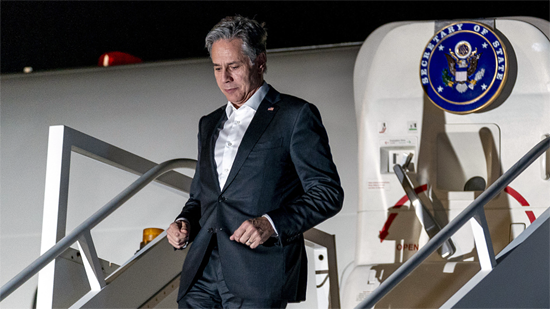CGTN
It says a lot about U.S. foreign policy imperatives, considering America’s refocused attention on Africa and hopes to secure some buy-in for countering China and condemning Russia. Such optics for U.S.-Africa cooperation, at a time when U.S. President Joe Biden’s own Africa strategy is in stealth, paints a compromising picture of U.S. diplomatic credibility on the continent.
As U.S. Secretary of State Antony Blinken proceeds with his three-nation tour of Africa and aims to build on an agenda that is big on geopolitical competition and interference, Biden’s conditional diplomacy can all but endure. “We have our own struggle for freedom and equality in the United States, and South Africa’s story is unique but there are also so many common elements, and that resonates powerfully,” said Antony Blinken in remarks in Johannesburg.
For starters, if Washington’s overriding focus is to contest African countries’ ties with Moscow and Beijing, Blinken’s tour will yield one of two outcomes. First, it will struggle to convince skeptical audiences in South Africa, the Democratic Republic of the Congo, and Rwanda that Washington genuinely considers them “geostrategic players and critical partners on the most pressing issues” of the day.
Second, it will highlight America’s own shortcomings to prevail as a cooperative player on key frontiers: from trade and investment in Africa, to tangible infrastructure-building.
Observers hoping for a credible advancement in U.S.-Africa cooperation are likely to be disappointed, given the weight of the Ukraine conflict on Blinken’s agenda. Washington has made no secret of its silence towards the likes of South Africa, following much of Africa’s principled neutrality towards the Ukraine conflict, and refusal to define ties with Russia and China from a cold-war lens.
After all, Blinken’s tour comes as a catch-up to Russian Foreign Minister Sergei Lavrov’s recent visit to the continent. America’s hopes of setting the initial tone on climate change, trade, health and food security in Pretoria – with an eye on Russia and China – could end up painting engagement as transactional, increasingly at odds with Africa’s fruitful experience with both Moscow and Beijing.
Another casualty could serve as Biden’s long-sought U.S.-Africa “reset.” This damage control effort formed the core of Blinken’s November visit to the continent in 2021, seen by some as a reiteration of America’s “greatness” with little to distinguish from Donald Trump’s cold indifference towards Africa.
Some recent polling suggests Washington would need more than just rhetoric to come through: young Africans no longer see America as their top choice for positive influence, and key drivers of engagement from within Africa are not U.S.-centric.
Thus, any attempts to deliberately align African countries’ positions on the conflict in Ukraine with that of the U.S. can add to existing divergences, particularly with Rwanda and the Democratic Republic of the Congo.
Blinken’s Rwanda stop is shaping up to be a controversial one because the U.S. insists on interfering in the country’s internal affairs through so-called “concerns” about democracy, human rights, transnational repression and wrongful detention. The same constraints accompany Blinken’s Democratic Republic of the Congo courtship: unsolicited inputs on the country’s election transparency, human rights, and “fundamental freedoms” raise questions about America’s ability to reach a consensus, rather than predetermine it.
Interestingly, when considering America’s selective diplomacy with Africa and its limits, South Africa is a case in point. The country occupies a unique place in the multilateral BRICS, demonstrating its close proximity to China and Russia. Also, from Ukraine to an increasingly independent foreign policy, South Africa has shown little appetite for an “adversarial” position on core issues, and remains vocal about the gaps in a U.S. reset thus far.
Therefore, Blinken’s three-stop Africa tour is an ill-suited opportunity for political point-scoring on the world-stage. Movement in that direction could drill more holes into an already fragile U.S. commitment to the continent.
Scores of African nations are still wary of former president Donald Trump’s deliberate and steady neglect of valuable relations, including through derogatory remarks. That is enough to make clear the irrelevance of camp politics, cold-war mentalities and geopolitical rivalries to furthering U.S.-Africa ties, all of which carry little hope for reclaiming lost U.S. ground.





